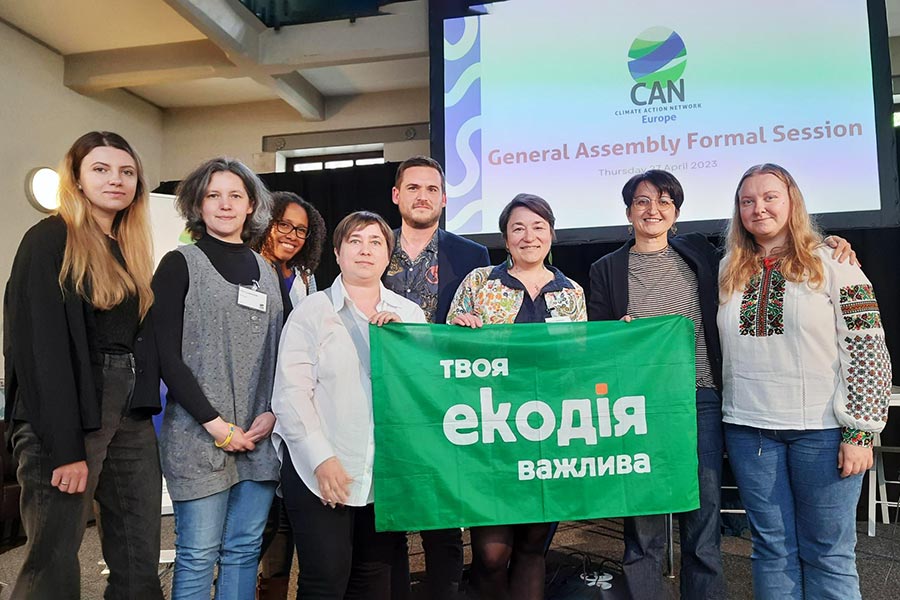On 27 April, the General Assembly of the largest network of climate NGOs – Climate Action Network Europe – took place in Brussels. It was at this event that the members of the network voted for the accession of new organisations from Ukraine. Among them: Ecodiya, Ecoclub, Green Wave, Khmelnytsky Energy Cluster, and NECU.
Why is it important?
CAN Europe unites more than 180 CSOs from 38 European countries, representing more than 40 million people in the EU, as well as in the Western Balkans and Turkey. Thanks to its many years of work in the field of climate and energy policy, the network is already highly recognisable and influential at the European Union level.
Together with its members, CAN Europe is actively working to ensure that European legislation is implemented at the national and local level. One of these projects is TogetherFor1.5, in which 13 national member organisations will strengthen advocacy for ambitious national climate and energy governance, starting with the process of revising National Energy and Climate Plans (NECPs).
In 2022, CAN Europe and other CSOs successfully campaigned for the withdrawal of seven EU member states (Spain, France, Germany, the Netherlands, Poland, Luxembourg and Slovenia) from the Energy Charter Treaty. This is an international agreement that protects fossil fuel investments and serves as a tool for compensation when governments take climate protection measures.
CAN Europe, together with international partners, also pushed for the adoption of the Loss and Damage Fund at the UN Conference of the Parties COP27 in 2022. The initiative to create the fund was voiced by the European Union in the last days of the negotiations.
What preceded this decision?
On 23 June 2022, the leaders of the 27 EU member states decided to grant Ukraine the status of a candidate for membership in the European Union. This means that Ukraine will continue its path of reforms in various areas to prepare for further accession. Gradually, Ukraine’s climate and energy policy will become closer to the relevant strategies, goals and laws adopted in the EU.
Bringing the public sector closer to the issues discussed at the EU level should help accelerate European integration reforms and prepare society for a gradual approach to a more ambitious climate policy.
Since 2017, Ecodia has been a member of the CAN network in Eastern Europe, Caucasus and Central Asia (EECCA), and has been supporting the network by hosting the CAN EECCA coordinator within its team. However, Russia’s full-scale war and the granting of EU candidate status to Ukraine have made Ukrainian CSOs question whether they want to continue to link their activities with the post-Soviet space.
In 2022, environmental NGOs created a joint appeal to the CAN international secretariat with a request to consider the possibility of Ukrainian NGOs joining CAN Europe. This request was considered and we were given this opportunity.
At the same time, the CAN EECCA network will continue to operate in the region, and members will be able to cooperate with Ukrainian NGOs without hindrance.

What’s next?
- We have a lot of work to do to improve EU climate and energy policy, especially in areas relevant to Ukraine, such as greening energy aid during the war, electricity exports, implementation of emissions trading system, CBAM, etc.
- Civil society experts will become more and more visible at the EU level during international meetings and official visits. Even small local CSOs will be expected to be more involved in cooperation and experience sharing at the European level, which in turn can bring new partners and investments to communities;
- Ukrainian organisations will have more opportunities to gain new knowledge based on the experience of their European colleagues, attract resources, and use the best practices of powerful European CSOs. However, of course, success will depend on the activity of Ukrainian CSOs themselves.

